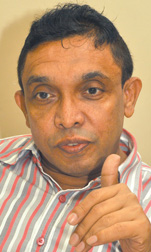Policy and institutional reforms vital to boost economic growth
By Gamini Warushamana
The economy is not stable today as the internal and external
financial situation is out of control, Prof. Sirimal Abeyratne of
Department of Economics of the University of Colombo, told Sunday
Observer Business last week.
Excerpts of the interview
|

Prof. Sirimal Abeyratne |
If we take the internal financial situation, this year, the country
has to pay Rs.3.5 billion as loan instalments which is much lower than
the tax revenue. Since the total tax revenue is insufficient for debt
servicing, to fulfill all the proposals in the 2015 Budget the
government will have to go for further borrowings.
Where external finance is concerned, it is a well-known fact that our
exchange rate is stable because it is kept stable by the Central Bank
and it is not market-driven stability. As export growth is weakening it
cannot be stable.
The huge trade deficit and balance of payments are bridged by the
growing foreign remittances into the current account and government
borrowings into the capital account.
This financial instability hinders economic growth. The development
strategy of the country should be greater integration and competitive
integration with the rest of the world. But this did not happen over the
years.
Therefore, in every sphere of the economy we need bold institutional
and policy reforms. This should be the priority of the government.
Our economic growth rate and many indicators are moving in different
directions and there is no consistency. Today, Sri Lanka has the
potential of achieving around 10 percent economic growth. Therefore, the
next 10-20 years are crucial for the country because the Sri Lankan
economy is at the doorstep of taking off, as internal and international
conditions are very conducive for it. This is the Asia's century in
global economic development.
This is the time to exploit this opportunity. Many countries in Asia
are doing this and Sri Lanka has a greater potential of an unimaginable
magnitude to exploit this situation but it needs clear policy direction
and policy reform process.
Infrastructure
There was a misconception that the massive infrastructure development
in the past few years alone would boost the economy. However, this did
not happen. Infrastructure development is necessary but that alone is
not sufficient for economic growth.
That's why the economy was stagnant over the past few years despite
infrastructure development. Growth is driven by investments and to
attract investments a country should create investor confidence.
Institutional and policy reforms are essential to create an
investor-friendly business environment. Once these conditions are in
place private investment will grow.
Long ago countries had to increase savings to finance investments
and, therefore, investments mainly came from domestic savings. However,
the situation has now changed and private investments flow to countries
where conducive investment environments are in place.
There are huge accumulated investment funds in the world seeking
better locations.
Twenty years ago total global FDI flow was at US $ 250 billion a year
and today it has increased to US $ 2.5 trillion. We have failed to
attract even a fraction of this huge FDI flow compared to our Asian
competitors such as Vietnam and India.
The government should show its policy direction. Not in the
macroeconomic front, in the political economy too there are challenges
for the new government.
One positive thing in the manifesto of the new President is his
pledge to end corruption and establish good governance and law and
order.
This is one essential component in creating a business -friendly
environment a fundamental need for in economic development. During the
Rajapaksa era all these deteriorated. It is the main reason for low FDI
inflow.
Political economy
However, in the new President's election manifesto we don't see
anything about economic reform and therefore, it does not give the
direction of our economic agenda. Instead we can see some out dated
economic policies such as import substitution, greater emphasis on
agriculture sector and protectionism in some sectors.
I think the government should give clear policy direction for the
next 10 years. The Government should not consider this presidential
election victory as similar to the 1956 Sri Lanka Freedom Party victory.
This is the opposite of that because all three ethnic groups, Sinhala,
Tamil and Muslim have voted for the new President. The Mahinda Rajapaksa
regime failed to deliver the dividends of peace to the people by
creating a pluralistic society.
Today, it is the responsibility of the new government to deliver the
peace dividend to the masses in terms of economic benefits, democracy
and freedom irrespective of ethnic or religious differences.
A stable government is essential for this no matter that it is a
coalition of many parties. However, it is a challenge considering the
present composition of Parliament.
|

